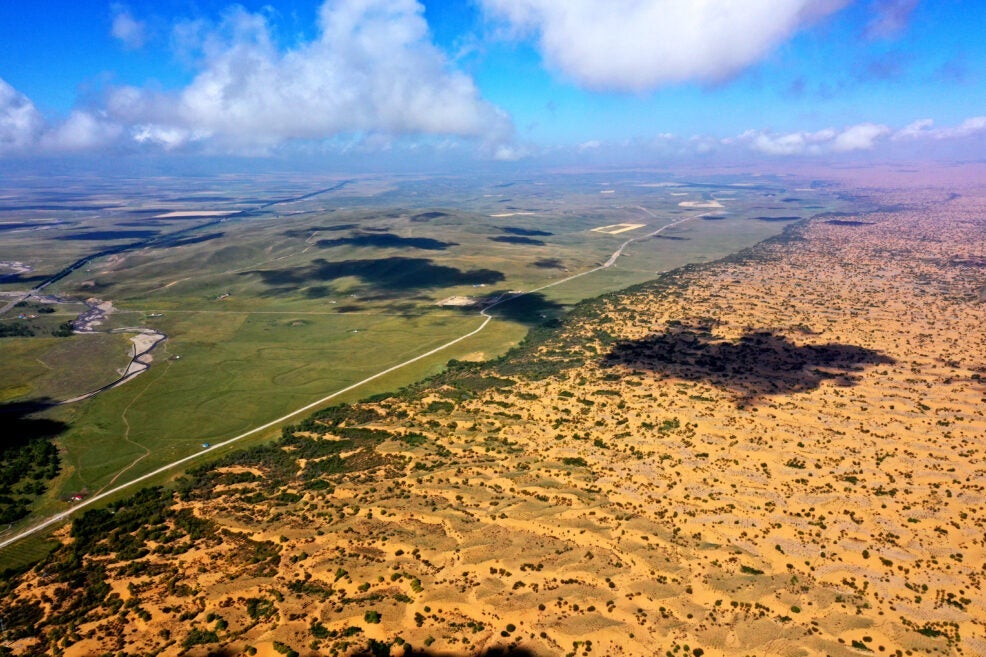
Building back better, and greener, is easier said than done. While FDI investors pledge their commitment to greener investments and net-zero policies, more action is needed in terms of protecting life on land and reaching the targets of the UN’s 15th sustainable development goal (SDG).
SDG15 focuses on protecting, restoring and promoting sustainable use of terrestrial ecosystems, sustainably managing forests, combating desertification, halting and reversing land degradation, and halting biodiversity loss.

Access deeper industry intelligence
Experience unmatched clarity with a single platform that combines unique data, AI, and human expertise.
“The various aspects of SDG15 are closely linked,” according to a PwC guide to SDGs. “Deforestation causes loss in biodiversity and contributes to reducing soil fertility. Forest loss also impacts climate change (and is the cause of up to 15% of global net emissions from human activity). Climate change exacerbates land degradation, which can lead to desertification, affecting 1.5 billion people, especially the poor.”
Challenges related to deforestation, loss of biodiversity, and land degradation impact millions of people across the world. Investment Monitor's Life on Land Risk Index 2021 reveals that 38.5% of countries around the world are considered to be high risk, with scores based on the proportion of important sites for freshwater biodiversity that are covered by protected areas, forest area annual net change rate, above-ground biomass stock in forest (tonnes per hectare) and the red list index that tracks data on species of mammals, birds, amphibians, corals and cycads.
Only 17% of countries are in the low risk category, with the largest share (44%) at medium risk, according to the analysis.

US Tariffs are shifting - will you react or anticipate?
Don’t let policy changes catch you off guard. Stay proactive with real-time data and expert analysis.
By GlobalData"Countries are moving toward a sustainable economy with the mixture of energy and digital transformation, and they all need viable green financial support," says Thomas Noto Suoneto, foreign policy analyst and associate consultant at the international advisory house Equatorise.
Noto Suoneto adds: "South East Asian countries for instance, are seeking sustainable foreign capital and technology transfer which can endorse their efforts in developing renewable energy, building electric-powered transportation and achieving net-zero emissions. Our challenges must be transformed into opportunities, and that is the essential role of foreign investment."
Which FDI projects can help to achieve SDG15's targets?
FDI will be essential to achieving the SDGs, including SDG15, says Peter Elwin, director of fixed income and head of textiles and land use programmes at financial think tank Planet Tracker.
He says SDG15 will require not just direct investment in agribusiness and forestry but an entire transformation of the global food system.
Chris Magero, senior programme officer, global drylands at the International Union for Conservation of Nature (IUCN), adds that the investment in nature-based recovery provides long-term sustainable investment options for FDI. “This ensures that investments are linked to sustainable environmental practices and also ensures social, cultural and economic development”.
Agroecology and alternative energy are among the key sustainable investment options, according to Magero. Agroecology addresses both the negative impacts of agriculture on land degradation and economically empowers local communities, while lack of access to alternative energy sources can lead to land degradation. He says that 60% of the African population do not have access to clean energy options, which is also linked to land degradation as forests are cleared for wood.
Other investments that could help achieve SDG15, according to the UN's SDG Investor Platform, are:
• Accessible financing for family agricultural sectors and micro, small and medium enterprises
• Affordable irrigation systems
• Agricultural crops storage
• Agricultural inputs
• Agricultural logistics services
• Cold storage and transportation
• Commercial agricultural developments for agricultural produce and livestock
• Communal cold storage infrastructure for farmers
• Community-based cultural tourism
• Food processing and collection services
• Green biotechnology
• Precision agriculture
• Plastic recycling and reprocessing
• Mixed plantation forestry for sustainable commercial timber production
• Large-scale rail infrastructure for cargo
• Digital platforms to service input (seeds, nutrition and pest control) needs of farmers and provide them with easy access to markets
• Production of compost and biofertilisers from food waste
What about the barriers?
Despite the opportunities to invest in sectors that contribute to the targets of SDG15, there are also challenges, including inertia in the existing system, according to Elwin. Subsidies, the lobbying of entrenched interests to resist change and the mismatch between the size of the initial investment opportunities and the minimum investment size of many institutional investors could all be obstacles to mobilising investment.
A lack of data is the biggest barrier to investments supporting biodiversity, according to research conducted by Responsible Investor and Credit Suisse. Other barriers include a lack of internal expertise and a lack of an agreed way to adequately value natural capital.
Despite the barriers to investment, protecting life on land should be an increasing focus for investors, as new ways to tackle land degradation and forest and biodiversity loss, without compromising on financial performance, are developed.
This is one of the articles in Investment Monitor’s 'SDG Focus' series. The full list of articles is listed below.
- SDG1 – poverty
- SDG2 – hunger
- SDG3 – health
- SDG4 – education
- SDG5 – gender
- SDG6 – water
- SDG7 – energy
- SDG8 – employment
- SDG9 – infrastructure
- SDG10 – inequality
- SDG11 – sustainable cities
- SDG12 – responsible production and consumption
- SDG13 – climate change
- SDG14 – life under water
- SDG15 – life on land
- SDG16 – peace, justice and strong institutions
- SDG17 – partnerships






